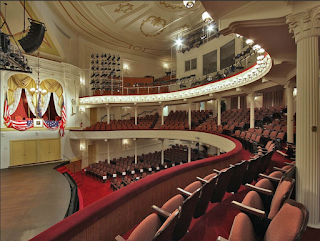Museum Hack and other Interpreters who SLAY
You can ask any history major why they got into history and it certainly varies a lot, but within their response is usually something about visiting museums and historic sites frequently growing up. From that, we all learn things we're passionate about and perhaps choose techniques to emulate.
I'm no exception to this "theory" and I find myself frequently reflecting on some of the best interpreters I've come across on vacations.
I credit my first experience with an exceptional interpreter at Ford's Theater in Washington DC. It was a while ago so I can't recall any precise details, but I do remember that he was the most passionate individual I had seen giving a tour up until that point.
In high school, we were required to complete either 72 hours to graduate or construct and present a presentation outlining what our college major would be. Incidentally I chose the presentation route. Probably since 11th, maybe 10th grade, I was fully aware of public history being a field and was taking AP classes to set myself up for my bachelors degree. While creating that presentation, I had to job shadow someone in the field and interview another. For the job shadow, I went to my local archives, but that's not entirely the interesting bit.
When I was camping the summer before my junior year, an interpreter came to the campsite to give a talk on the Pennsylvanian forester as well as his reenactment experience with the Donegal Township Riflemen. He was kind enough to answer questions about being a reenactor and historian. His presentation however, was more than likely what sealed the deal for me to enter the field of history.
My last personal experience with an amazing interpreter is also likely the most recent experience. For the first time, my family and I went to Fort Raleigh in North Carolina, which preserves the site of the lost colony of Roanoke. The Park Ranger of the site was absolutely amazing. There was a lecture on what happened and he debunked a lot of theories and went over some others that are far more plausible. The way he did it though was so (for lack of better words) sharp and snappy, and with a site that is rife with conspiracy and misinformation, it was honestly the best way to address the history.
Now that leads into one of my personal favorite companies: Museum Hack.
Since I first heard of Museum Hack, I've been obsessed with their theory of fast tours that are filled with passion and encouragement to step outside of a stuffy art museum; and art museums are perhaps those who can benefit the most. I don't know about others, but there is a certain "esthetic" of art museums: white walls, work of art, description - that's it. They're quite, contemplative places that are great for the thinker, but terrifying to the 10 year old in all of us.
Museum hack takes that expectation and flips it on its side. They run scavenger hunts and corporate team building exercises and encourage all the things that the art critic might turn their nose up at. It's a wonderful way of breaking down that expectation for museums and constructing a new reality.
Festina Lente my friends
--Jess--
I'm no exception to this "theory" and I find myself frequently reflecting on some of the best interpreters I've come across on vacations.
 |
| Ford's Theatre |
In high school, we were required to complete either 72 hours to graduate or construct and present a presentation outlining what our college major would be. Incidentally I chose the presentation route. Probably since 11th, maybe 10th grade, I was fully aware of public history being a field and was taking AP classes to set myself up for my bachelors degree. While creating that presentation, I had to job shadow someone in the field and interview another. For the job shadow, I went to my local archives, but that's not entirely the interesting bit.
When I was camping the summer before my junior year, an interpreter came to the campsite to give a talk on the Pennsylvanian forester as well as his reenactment experience with the Donegal Township Riflemen. He was kind enough to answer questions about being a reenactor and historian. His presentation however, was more than likely what sealed the deal for me to enter the field of history.
 |
| Fort Raleigh |
Now that leads into one of my personal favorite companies: Museum Hack.
Since I first heard of Museum Hack, I've been obsessed with their theory of fast tours that are filled with passion and encouragement to step outside of a stuffy art museum; and art museums are perhaps those who can benefit the most. I don't know about others, but there is a certain "esthetic" of art museums: white walls, work of art, description - that's it. They're quite, contemplative places that are great for the thinker, but terrifying to the 10 year old in all of us.
Museum hack takes that expectation and flips it on its side. They run scavenger hunts and corporate team building exercises and encourage all the things that the art critic might turn their nose up at. It's a wonderful way of breaking down that expectation for museums and constructing a new reality.
Festina Lente my friends
--Jess--




Comments
Post a Comment